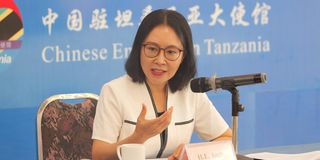Leveraging China’s support: Tanzania's development strategy for Vision 2050

What you need to know:
- The government has expressed its commitment to securing financial and technical support from China to drive priority projects in areas such as industrialisation, trade, digital transformation, green development and rural revitalisation.
Dar es Salaam. Tanzania is poised to harness the significant opportunities arising from the Forum on China-Africa Cooperation (FOCAC) Beijing Action Plan (2025-2027) to boost its economy and accelerate progress towards its Vision 2050 development goals.
As one of the key African participants in the FOCAC summit held in Beijing earlier this month, Tanzania’s government has expressed a commitment to securing financial and technical support from China to drive several priority projects.
These projects align with the FOCAC focus areas, including industrialisation, trade, digital transformation, green development, and rural revitalisation.
Experts have said Chinese President Xi Jinping’s pledge of 360 billion yuan (over Sh138 trillion) in financial assistance to African countries over the next three years presents a timely lifeline for Tanzania.
Through a mix of credit lines, fresh investments, and capacity-building initiatives, Tanzania has a unique opportunity to advance key sectors and address challenges such as unemployment, poverty, and infrastructure deficits.
For this transformation to materialise, Tanzania has signalled its intention to leverage China’s expertise, especially in areas where China has excelled, such as poverty eradication and industrial development.
The Permanent Secretary for the Ministry of Foreign Affairs and East African Cooperation, Ambassador Samwel Shelukindo, emphasised that Tanzania will submit several well-prepared projects for consideration under the FOCAC framework.
“We have identified priority projects that have already undergone evaluation and feasibility studies, allowing us to shorten the time needed to secure funding,” he said during a meeting with Permanent Secretaries from 12 ministries on September 20, 2024.
One of the priority areas is industrialisation, where Tanzania seeks to strengthen its local manufacturing and value chains.
According to Ambassador Shelukindo, attracting Chinese investment into industrial parks and expanding local processing of minerals will be critical to boosting exports and creating jobs.
Another significant focus for Tanzania is its ambition to become a digital economy hub. Experts say this vision is well-aligned with the FOCAC initiatives, particularly China’s support for industrial cooperation and technology transfer.
An economic expert from the University of Dodoma, Mr Geofrey Macha, believes Tanzania’s digital transformation can benefit significantly from the FOCAC framework.
"For Tanzania to transform into a digital economy, as outlined in Vision 2050, it needs to leverage partnerships like FOCAC. China’s experience in becoming a global technology leader can help accelerate our progress," Mr Macha said.
Mr Macha added that accessing the promised funds will require Tanzania to submit proposals that align with China’s vision for Africa.
“China will provide funding based on strategic projects, so Tanzania must ensure its proposals meet the criteria for industrial cooperation, digital innovation, and green development,” he said.
Seizing opportunities in trade and agriculture
Tanzania’s long-standing relationship with China provides an edge in trade, and the FOCAC resolutions offer the potential to open more doors for Tanzanian products in the Chinese market.
According to Chinese Ambassador to Tanzania, Chen Mingjian, President Xi Jinping’s commitment to making Tanzania a “demonstration zone” for China-Africa high-quality cooperation under the Belt and Road Initiative highlights Tanzania’s strategic importance.
"Tanzania has always actively participated in FOCAC activities and supported its development. The cooperation between our countries has deepened, and we stand ready to support Tanzania in achieving its economic and development goals," Ambassador Chen said.
Agriculture is also a key area where FOCAC initiatives can help Tanzania. With China’s focus on rural revitalisation and green development, Tanzania is well-positioned to improve agricultural productivity and access international markets.
To fully benefit from FOCAC, experts emphasise the need for a well-coordinated national strategy that aligns with both Tanzania’s vision and the FOCAC focus areas.
Executive Director of REPOA, Dr Donald Mmari, stressed: "This is a great opportunity for countries like Tanzania. However, without a clear strategy, it will be difficult to realise the benefits of the FOCAC plan.”
He pointed out that Tanzania has a strong relationship with China, and with the right strategic focus, it could emerge as one of the top beneficiaries of the FOCAC initiatives.
“Tanzania’s development agenda, especially in industrialisation, digital transformation, and green development, fits well within the FOCAC framework,” he said.
As Tanzania moves to submit its priority projects for funding, reports have it that the Ministry of Finance has been tasked with providing guidelines to ensure the proposals are ready for implementation.
By fast-tracking project submissions and prioritising initiatives that align with FOCAC’s goals, Tanzania hopes to secure early funding to boost its economic growth.
Ambassador Shelukindo emphasised that beyond securing funding, Tanzania will also target increasing its exports to China and will work closely with the private sector to identify investment opportunities.
“We will engage Chinese companies and promote Tanzanian products that meet required standards for export to China, benefiting our local industries and farmers,” he said.





